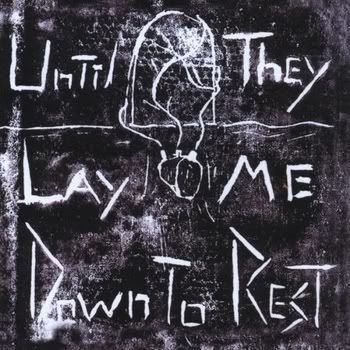
[purchase]
If you took a pair of dirty shot glasses and made eyeglasses out of them, it would no doubt affect your worldview. On Until They Lay Me Down to Rest, Grace Askew shows what the world might look like in that case. It’s not a pretty sight, but Askew keeps us listening because she cares about the characters she presents. The album does not set out to dazzle the listener with the playing. The musicians provide the perfect support, but it is Grace Askew’s singing and songwriting that must carry the day. They do, beautifully.
I’ve talked before about artists who perform solo, but have fuller arrangements on their albums. Sometimes, I want to strip away all of the production, and just hear the artist. Other times, I marvel at the arrangements, and wonder how the artist could possibly perform without a band. Grace Askew sings, and the album notes call her instrumental contribution “rhythm guitar”. That’s true here in an unusual way: Askew plays in a style so rhythmic that her contribution might as well say “guitar and percussion”. The songs here were recorded in two separate sessions. Four songs were recorded with Richard Ford playing various instruments, but only one per song. Four more songs were recorded with a band consisting of drums, stand-up bass, and electric guitar. That’s eight songs total, and there is a ninth which sounds like it was done in the Ford session, but there are no production credits for that one on the album. So the Ford sessions only add a little color to Askew’s performance, and even the full band sessions have the band playing with a light touch. From all of this, I am sure that Askew could carry the show just fine playing solo, but the additional instrumentation here is done beautifully.
Askew sings in a breathy alto. That way of singing is almost a cliché these days, and it sounds like an affectation for many singers. But Askew is the real deal, and she can make it sound like a bluesy moan or a sexy purr. She knows how to add or subtract air to get just the tone that the song needs. On When I Get Buried, it sounds like a cry for help from the darkness. But on the very next song, This New One, her voice conveys the thrill of a new love. Later, Toasting for Two presents a main character who is struggling to escape codependency, and her voice wavers between despair and hope.
All of these songs are beautifully written. Askew’s motto could be “just enough”. Her words paint pictures of characters who are completely believable, and never overwritten. So far, I’ve mentioned three relationship songs, and there are others here as well. But I was particularly impressed with the songs here that evoke a sense of place. Place, for Askew, is defined by the people you find there. At the Brass Rail is a perfect example of this. Askew sketches in a series of denizens of this motel and bar; she never says anything about what the place looks like, but you can see it in your head by the end of the song. Beautiful Mess describes a bar in the same way, and just as clearly. Tom Waits writes these kinds of songs sometimes, and these two are that good. But Gone presents a series of characters in terms of how they react to the narrator, and she to them, and this works just as well.
So I’ve talked about six of the nine songs here, and I don’t usually do that. But it would be easy to go on. Until They Lay Me Down to Rest is a set of sympathetic arrangements that put the focus on the singing and songwriting of Grace Askew. And that is exactly right. I have a slight preference for the full band arrangements here, but whatever Grace Askew decides to do next will have my interest.
Grace Askew: At the Brass Rail
Grace Askew: But Gone






1 comments:
Darius, your voice for commentary is extraordinary. I'll enjoy this discovery vry much.
Angie at Eat Here
Post a Comment